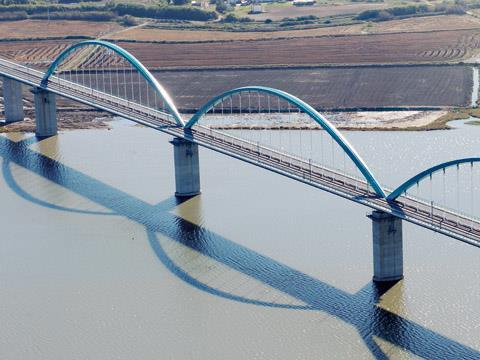
PORTUGAL: Eight rail projects have been included in a list of 30 investment schemes identified as priorities to encourage economic development as the country seeks to recover from its financial problems.
Expected to be completed by 2020, these schemes represent a total investment of €5·1bn, of which between 54% and 61% is envisaged as coming from European funding.
The list has been drawn up by a working group established by the Secretary of State for Infrastructure, Transport & Communications in August 2013 to identify infrastructure projects with a high added value. From an initial list of 238 proposals, 89 were selected for further analysis. As well the eight rail projects, the final shortlist includes 18 maritime, two road and two airport schemes.
Top priority among the rail projects is to complete the modernisation of Refer's Northern main line between Porto and Lisboa by 2016 at an estimated cost of €400m. Completion of modernisation work on the east - west Beira Alta corridor linking Aveiro and Vilar Formoso on the Spanish border would follow after 2016, requiring €900m. Another €145m scheme would see the modernisation and electrification after 2016 of the Minho line between Nine and Valença, to complete the cross-border Atlantic corridor from Porto to Vigo.
The Algarve line connecting Lagos with Vila Real de Santo António via Tunes and Faro would be modernised at a cost of €55m, while €20m is envisaged for work on the South line between Praias do Sado and the port of Setúbal. The long-planned modernisation of the Cascais suburban line running west from Lisboa is now priced at €160m, while another €135m is needed for upgrading the West line linking Alfarelos with Figuera da Foz and Louriçal.
By far the biggest scheme, requiring an investment of more than €1bn, is the construction of the proposed international freight and passenger rail link connecting Lisboa, Setúbal and Sines with the Spanish border at Caia near Elvas. This had initially been launched as a PPP project, but was halted following the financial crisis.
Development of the international rail corridors is closely linked to projects for new deep-water port facilities and container terminals at Lisboa, Setúbal and Sines, as well as improvements to the port of Aveiro which would enable Portugal to play a bigger role in European trade.
The government has opened discussions with the opposition parties before embarking on public consultation over the proposals, although it is not yet clear how the local share of the funding can be resourced.

















